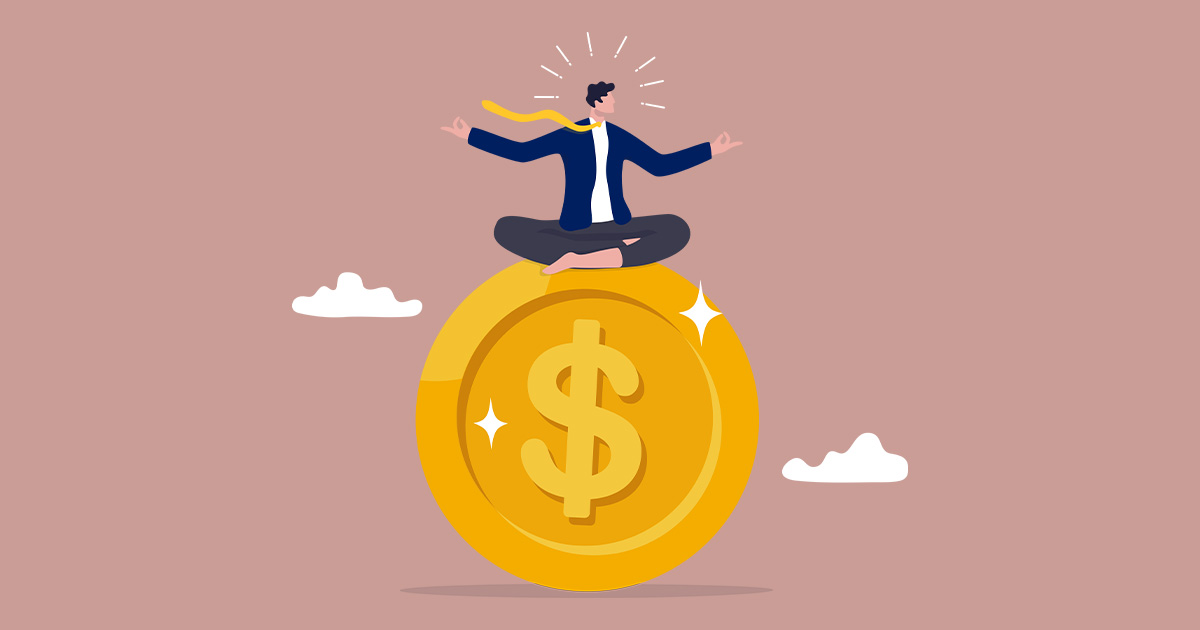
The Connection Between Mental Health and Money: Solutions for Improving your Well-being.
Financial challenges can arise at any stage of life, whether you are a recent college graduate, a parent, or approaching retirement. Americans are feeling the strain on their wallets and mental health, fueled by factors including rising costs of living, mounting debt, higher inflation rates, and other economic difficulties. According to a study highlighted in Forbes, a staggering 78% of Americans live paycheck to paycheck.
Whatever your personal financial situation is, many individuals are struggling to cope with the pressure finances can have on our relationships, social lives, and mental well-being. Research confirms what many of us feel – There is a direct correlation between financial pressures and psychological distress.
Understanding the Link
According to Psychology Today, a recent study found an association between financial worries and psychological distress among adults in the United States. Additionally, a 2023 Bankrate survey found that 52% of respondents cited money as something that negatively impacted their mental health. Some of the reasons for this include concerns over debt, inflation/rising prices, not having enough savings, and a range of other economic factors.
The impact of financial insecurity goes beyond just stress. A recent study found individuals with the lowest incomes are 1.5 to 3 times more likely to experience common mental illnesses such as depression and anxiety than wealthier members of the same community.
Recognize you aren’t alone
If you find yourself feeling upset, stressed out, or losing sleep over money, rest assured you're not alone. Many people experience financial worries throughout their lives. Recent research conducted by CreditWise revealed a staggering 73% of Americans consider money their number one source of stress. Money issues and stress are also often linked to the development of mental health problems such as depression and anxiety.
Practical Strategies to Start Today:
If you find yourself grappling with financial challenges, you don’t have to face them by yourself. We’ve compiled some helpful tips you can use to get your finances under control and reduce strain on your mental health.
Create a Budget (and stick to it)
Budgeting is the foundation of financial stability. It might seem basic, but there’s a reason this tip comes up time and time again. Budgeting helps you understand what you have and how you spend your money so you can build a plan that works for you and your financial goals.
Can you go without eating out several times a week? Do you really need to purchase that new car? Can you postpone a vacation in lieu of a staycation? Once you create a list of your monthly expenses and evaluate your needs versus wants, it’s easy to see what areas you can cut back on to help you reach your financial goals.
A commonly used budgeting method is the 50/30/20 rule. The breakdown is simple: 50% of your budget should be used for needs like bills and groceries, 30% goes towards your wants like movies and eating out, and the last 20% is for building your savings. To make saving easier, Nerd Wallet also suggests setting up your paycheck to automatically deposit the funds into your savings account every month. This takes away the temptation to use it for something else and will help you stick to your savings and budgeting plan throughout the year.
By making small adjustments in your daily life—such as eating out less, shopping only for necessities, refinancing loans, or cutting back on unnecessary expenses—you can make a significant impact on your financial well-being in the long run. Small sacrifices today can lead to substantial financial changes tomorrow.
Get Help from a Financial Counselor
Enlist the help of a financial counselor who can guide you through the process and assist in planning for your future. Defining your financial goals and putting them down on paper is crucial. By doing so, you create a visual reminder of what you're striving for and develop a clear roadmap to follow. Remember, achieving financial goals is not an overnight endeavor. It does take time and some trial and error to find what works best for you.
Prioritize Emergency Funds
According to Fortune, 57% of Americans can’t afford a $1,000 emergency expense. Some of the major contributing factors for this include inflation and rising costs. However, it’s important to build as much of an emergency fund as you can. When the unexpected happens, it’s good to have a cushion in place for your peace of mind.
Keeping an emergency fund can help you avoid having to fall back on credit cards or loans in times of crisis. Having to make additional payments each month can compound your financial stress and add a further strain to your mental health.
Tackle Debt Strategically
Managing debt can be difficult. Whether it’s student loans, credit cards, a mortgage, medical bills, etc., trying to get out of the red can feel impossible. That’s why it’s important to get a handle on your debt. Step one in getting your payments on track is to calculate your debt-to-income ratio. Your goal ratio is 43% or less. This is a great starting point for approaching your financial goals, so you can feel more confident in your financial future.
If you feel like you are sinking below the proverbial waves of loan payments every month, hopefully, you can feel at least like you are treading water once again. Depending on your personal situation, you might be eligible to apply for a debt consolidation loan. This can provide a more streamlined way for you to pay down your debt. You can even find out if a debt consolidation loan is right for you.
Schedule regular financial check-ins
Regularly reviewing your financial progress and holding yourself accountable are essential components of financial management. By incorporating routine check-ins into your schedule, you can stay on track with your plan and boost your confidence in managing your finances. You can do these with your household, or with your banker or financial advisor to make sure you’re still on track. As you practice and become more adept at handling your money, tasks such as reviewing your budget, balancing your checkbook, and paying bills online will become easier and less stressful. Dedicate a specific time each week, even if it's just 30 minutes, to track your finances and make it a consistent part of your life. Once you find that you require less time for these check-ins, you can gradually transition to conducting them every other week.
Seek Assistance if You're Overwhelmed
If you feel overwhelmed, don't hesitate to seek professional assistance for your mental health. Many resources offer free consultations and can provide valuable support. For instance, many employers offer an Employee Assistance Program (EAP) that can support you through difficult times – both emotionally and financially.
Financial Wellness Offerings with Community First
At Community First, we have partnered with the industry-leading program BALANCE to provide all members with free financial resources. Talk with certified financial counselors, attend informative webinars, complete personal financial education modules, and take advantage of even more resources to improve your money management skills. Regardless of your current financial situation, there is help available to support you in planning and improving your circumstances. Money is not just a practical matter; it has a profound emotional impact on our lives. By taking proactive steps to manage your finances and improve your overall well-being, you can create a path towards financial stability and reduced stress.
Also, our moveUp Financial Wellness Program can help you plan, offering you free tools and resources to improve your money management skills. Here at Community First, we support your financial and personal goals. Putting you first isn’t just our name; it is who we are. For even more tips and support, read our blog on The Emotional Side of Money: Regaining Control and Finding Financial Peace. Once you have a plan, you can worry less and start living your best life.
Want to sit down and ask more financial questions to an expert? Schedule an appointment at a branch near you.
Budgeting & Money Management Tips from Community First
- Should You Save or Pay Debt?
- What is a Money Market Savings?
- How to Save Money for the Holidays
- Easy Ways to Save for an Emergency Fund
- How to Plan for Your Child's College Education









